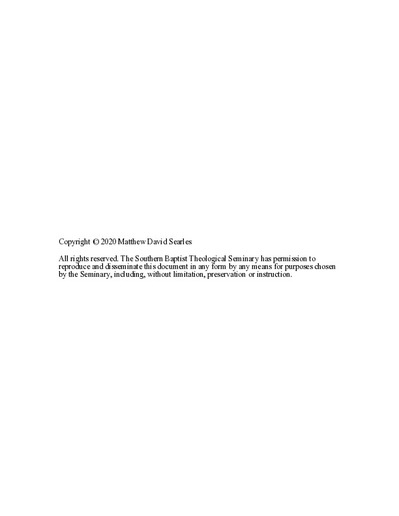| dc.description.abstract | The main argument of this thesis is that the Psalms are words graciously given
by God for believers to use when they pray to him. There are words here for all seasons.
In recent years there has been a growing trend to see the words of the Psalms as
belonging on Christ’s lips only, not the believer’s. There is a good desire here, as one
must take seriously Jesus’ words about the Old Testament that these are the Scriptures
that “bear witness about me” (John 5:39).
This thesis argues that seeing the Psalms as being “the words of Jesus” and
thus only secondarily intended for use by Christian believers is not the picture presented
by the Psalms themselves, nor the New Testament use of the Psalms. The goal of this
thesis is to give Christians confidence in reading, praying, and singing the Psalms.
Chapters 2-3 lay some groundwork, introducing the world of poetry (chap. 2) and song
(chap. 3). Chapters 4-9 seek to defend the subjective use of the Psalms. Chapters 4 and 5
look at the testimony of the Psalms themselves (chap. 4) and the New Testament use of
the Psalms (chap. 5). The psalmists themselves at times see themselves as examples for
believers (not merely prophetic of one to come), and the New Testament authors also
read the Psalms in such a way. The next three chapters address some of the issues that
might make Christians believe that some psalms cannot be properly taken on their own
lips: claims to righteousness (chap. 6), enemies (chap. 7), and praying for judgment
(chap. 8). Chapter 9 shows that being prepared to use the Psalms in this subjective way
(and thus not see Christ as the singer of every psalm) does not rule out Christ-centered
interpretation, but allows for more and richer avenues of fulfilment in Christ; he is seen
not only as the singer but as God, as the one who achieves the salvation of which the
Psalms speak, and as the human king.
Chapters 10-13 consider different types of psalm, and for each looks at how
psalms like this may be read and understood. For each type of psalm, consideration of
typical features of this sort of psalm is accompanied by reflection on how Christians can
engage with such a psalm, often using a ‘how much more in Christ’ hermeneutic. | en_US |

